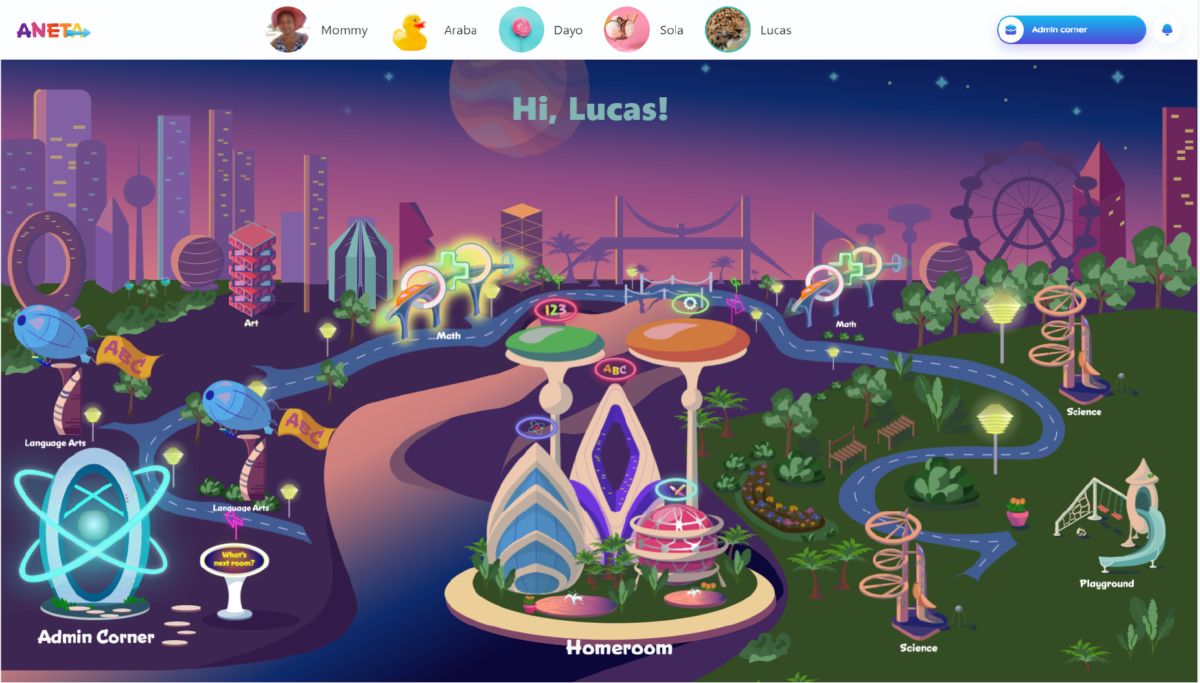For DC founder Afua “BB” Banful, the growing pains of pandemic-prompted at-home learning were about much more than just parents being unable to concentrate.
When COVID-19 lockdowns began in 2020, Banful said she had a difficult time navigating not only trying to work with children at home, but also navigating her kids’ screen time and web access. At the same time she had to log her 4-year-old into a tablet or website, she had to make sure her 8-year-old was getting her schoolwork done online. At one point, Banful said, she had eight Alexa alarms set and was still missing things like appointments or homework assignments.
With all of the technology that allows for pre-scheduling today, Banful said she was shocked to find that she couldn’t find a great way to pre-schedule and pre-approve screen time.
“I can’t believe I can set my dishwasher [to run], I can set the oven and I can’t set access to a website,” Banful told Technical.ly.
In April 2020, Banful set out to find a solution for this issue, and founded local edtech startup Aneta Ed — a 2022 RealLIST Startups honoree — later in the year. While Aneta is a completely remote company at the moment, it reminds of the long history of success for edtech companies in the region.
The company’s platform serves as a “wayfinding” solution for parents looking for help with their kids’ digital access. The online space offers connections to safe sites for kids and helps parents manage a schedule for when they can be on the internet.

Afua Banful. (Courtesy photo).
Through its Anetapacks feature, parents can connect their kids to a teacher-created digital journey. That could include resources, websites, exercises, and worksheets on specific topics like farm animals or popular books, plus a screen time schedule. Think of it as the digital version of an educator sending a student home with a backpack full of relevant books and a study schedule.
“Your child can follow a digital journey that someone thoughtful has built,” Banful said. “So when you go to the scheduling, you are not faced with a blank calendar of what do I have to do, what is appropriate, what are the resources?”
The Anetapacks can be school-specific or for fun and can include “pretty much anything that parents approve of that has a URL.” It can even set 15 or 30 minutes of locked screen time to encourage kids to take a break. Parents can also adjust the schedule to what works for their kids and add links and resources to the pack. There’s also a “homeroom” page for resources that a child can use at any time.
Aneta, which was officially launched in January 2021, was initially self funded by Banful before she raised $280,000 in a friends and family round. This year, she’s planning to launch a $1 million raise in Q2, which will be used to finesse the online platform and add at least two full-time employees, as well as a host of part-time contractors. The company will also be launching an Anetapack marketplace, where teachers can sell their Anetapacks to parents.
As she expands the platform, Banful hopes to switch to a monthly subscription for parents. With this model, she also intends to allow parents to pay more than the sticker price and sponsor other students who otherwise couldn’t afford the platform. And in the coming year, she plans to add partnerships with schools and after-school programs to help parents who might not be able to afford Aneta or don’t have as much time to put towards managing their kids’ online use.
“I want to also make Aneta accessible, especially to Title I students or Black and brown kids who otherwise would not even know that there is a Kids Britannica,” Banful said.
Overall, though, she hopes that Aneta can help parents navigate the digital ecosystem for their children.
“[My daughter] has been exposed so much to digital, and we can’t stop it,” Banful said. “So I want to make that time that she is going to be on the screen productive.”
Before you go...
Please consider supporting Technical.ly to keep our independent journalism strong. Unlike most business-focused media outlets, we don’t have a paywall. Instead, we count on your personal and organizational support.
3 ways to support our work:- Contribute to the Journalism Fund. Charitable giving ensures our information remains free and accessible for residents to discover workforce programs and entrepreneurship pathways. This includes philanthropic grants and individual tax-deductible donations from readers like you.
- Use our Preferred Partners. Our directory of vetted providers offers high-quality recommendations for services our readers need, and each referral supports our journalism.
- Use our services. If you need entrepreneurs and tech leaders to buy your services, are seeking technologists to hire or want more professionals to know about your ecosystem, Technical.ly has the biggest and most engaged audience in the mid-Atlantic. We help companies tell their stories and answer big questions to meet and serve our community.
Join our growing Slack community
Join 5,000 tech professionals and entrepreneurs in our community Slack today!

The person charged in the UnitedHealthcare CEO shooting had a ton of tech connections

From rejection to innovation: How I built a tool to beat AI hiring algorithms at their own game

Where are the country’s most vibrant tech and startup communities?



